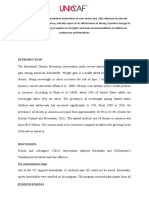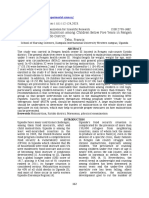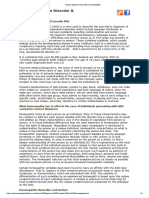Annotated Bibliography Final
Annotated Bibliography Final
Uploaded by
api-252551056Copyright:
Available Formats
Annotated Bibliography Final
Annotated Bibliography Final
Uploaded by
api-252551056Original Title
Copyright
Available Formats
Share this document
Did you find this document useful?
Is this content inappropriate?
Copyright:
Available Formats
Annotated Bibliography Final
Annotated Bibliography Final
Uploaded by
api-252551056Copyright:
Available Formats
Days 1
Aliyah Days Professor Wolcott Annotated Bibliography What Parents and Doctors Can Do About Childhood Obesity This annotated bibliography shows the effects and influences of parents and doctors on childhood obesity. Childhood obesity has always been an issue in the world. Though over the past few years, the rate of childhood obesity has drastically increased. The communities involved are doctors, parents, and children. Doctors and parents are both needed for there to be a positive change in the rate of obesity. Doctors need to educate parents and parents need to educate and provide their children with a healthy lifestyle. Most of the documents found in this annotated bibliography are found in different medical journals all around the world. According to dictionary.com, these are a few terms to know that are found throughout the articles are: Obesity: the condition of being very fat or overweight Physician: a person who is legally qualified to practice medicine Pediatric: the branch of medicine concerned with the development, care, and diseases of babies and children Cardiovascular: of, pertaining to, or affecting the heart and blood vessels Coronary: of or pertaining to the human heart, with respect to health Bariatric: of or relating to the treatment of obesity
A few of the journals that were used are the Journal of Paediatric and Child Health and the British Medical Journal. These articles all range from 1966 to 2010. These dates are relevant to this topic, childhood obesity, because it shows how long childhood obesity has been a problem in the world. As the time period becomes more present, the articles show how the childhood obesity
Days 2
rate has skyrocketed and how more children are having to deal with adult- like illnesses, i.e. type 2 diabetes and heart problems, early on in life. These article provide insight into the world of doctors and parents and what they can do to help not only decrease the rate of childhood obesity, but prevent it as well. Asher, P. "Fat Babies and Fat Children. The Prognosis of Obesity in the Very Young." Archives of Disease in Childhood 41.220 (1966): 672-73. University of Central Florida Libraries. Web. 9 Mar. 2014. Patria Asher is an author who has written many books about medicine. She works at the Institute of Child Health in Birmingham. Obesity in children is now leading to obesity in adults. Patients and doctors don't necessarily like to have to treat and deal with obesity. When children would visit doctors, the doctors would state how the child will grow out of their obesity, when that truly wasn't the case. Children of different ages, heights, and weights were put into treatment for weight loss. They were observed and doctors were able to see who lost the most weight and determine how long that particular child had been obese for. This source is great for my annotated bibliography because it shows how children who were obese as babies, typically have a harder time trying to lose weight. Treatment doesn't seem to work for obese children because they tend to eventually gain the weight back, so it's best to just prevent childhood obesity. Braet, C, M Van Winckel, and K Van Leeuwen. "Follow-up results of different treatment programs for obese children." Acta Paediatrica 86.4 (1997): 397-402. Wiley Online Library . Web. 15 Mar. 2014. C. Braet, M. Van Winckel, and K. Van Leeuwan all work for the Department of Developmental and Personality Psychology and Department of Paediatrics at the
Days 3
University of Ghent in Belgium. The three authors of this article were trying to find an effective way to go about the problem of childhood obesity. All of the different approaches they tried have not worked because the children cannot seem to have long term weight loss. Over 200 children were studied that needed treatment. And a little over 50 school children, who were obese, were also studied. They were all put into different types of therapies like, group therapy and individual therapy. After six months, there was a huge improvement with weight loss for the 205 different children that were treated. Though, the school children were actually gaining weight. This source is a good source for my annotated bibliography because it shows how all sorts of doctors are useful in helping lower the rate of obesity. In this case, psychologists and therapists were able to help this group of children lose weight effectively for a long period of time. Charles, Katie. "Daily Checkup: Early Education Can Head off Childhood Obesity." New York Daily News. NYDailyNews.com, 10 Nov. 2013. Web. 12 Mar. 2014. Katie Charles isn't necessarily a doctor of any kind, but she has written over twenty articles about different health problems, including childhood obesity. Many different doctors around the world have tried to find a way to improve the childhood obesity rate. This article speaks directly about Dr. Valentin Fuster, who is a cardiologist. Dr. Fuster and the well- known children show, Sesame Street", teamed up to create a show where children can be learn healthier ways of living. A child's health is determined between the age of three and five, so not only does the child need to be learning to live a healthy lifestyle during this time period, but their parents need to be teaching them as well. Parents play a big role in childhood obesity. Sometimes it isn't as easy for a parent to make a lifestyle change as it is for a child. So by a parent being able to change and create
Days 4
a healthier environment for a child, the child will be able to become healthier. This source is a good source for my annotated bibliography because it shows all of the different things that doctors can do to try and lower the obesity rate. Since television is such a prime activity in children, making a popular show teach healthy values could help to prevent childhood obesity. "Childhood obesity: a doctor's responsibility?." - Paediatrics Update January 2013. N.p., n.d. Web. 12 Mar. 2014. Childhood obesity is a worldwide problem, not only for the child, but for parents and doctors too. Parents are responsible for the way their child eats and the healthy choices their child makes. Though, doctors are the people that are primarily supposed to educate parents and children on preventing childhood obesity. It's known that parents dont necessarily realize that their child is obese and that is a main concern in childhood obesity. This source is a good source for my annotated bibliography because it shows the different roles that parents and doctors take part in with childhood obesity. It shows how doctors and parents need to work together by both playing their parts to improve the childhood obesity rate. Although there is no direct author for this article, the Medical Protection Society (MPS) published it. MPS is a society that helps healthcare professionals with legal and ethical problems that come about with their professions. Daniels, Stephen R.. "The Consequences Of Childhood Overweight And Obesity." The Future of Children 16.1 (2006): 47-67. Project MUSE. Web. 15 Mar. 2014. Stephen R. Daniels is a Professor of Pediatrics at the University of Colorado, School of Medicine. He is also a pediatrician and works for the Children's Hospital Colorado. Childhood obesity has become a well-known problem in the world today. Obesity is
Days 5
becoming very common in children and poses a heavy threat on the health of many young children. Children are starting to have different illnesses and diseases that were only apparent in adults at one point. Cardiovascular problems is a main issue that comes about from obesity. It is already a bad enough problem in adults, but when it happens in children it makes it a lot worse. It accelerates the problems and makes them more damaging in children. For the first time the life expectancy might decrease instead of increase. At this rate, children being more obese and unhealthy will lead to them having many health issues and not being able to live as long as adults are today. This source is a good source for my annotated bibliography because it shows how life threatening childhood obesity really is. It shows that children are having many health related issues that are typically only found in adults and that could lead to the life expectancy to potentially decrease. This should raise a major concern in the world today. Davis, M. M., B. Gance-Cleveland, S. Hassink, R. Johnson, G. Paradis, and K. Resnicow. "Recommendations For Prevention Of Childhood Obesity." Pediatrics 120.Supplement (2007): S229-S253. Pediatrics . Web. 15 Mar. 2014. Matthew M. Davis, Bonnie Gance- Cleveland, Sandra Hassink, Rachel Johnson, Gilles Paradis, and Kenneth Resnicow are all doctors who also specialize in different health fields. Childhood obesity is extremely important today because of it raises the health risk of children. The rate of childhood obesity needs to be lowered to help prevent obesity in adulthood. Families and the environment that a child lives in are critical towards a child's health. Through interventions in a child's home, it's hoped to use the social learning theory. This theory is thought that if a parents behavior is changed then a child's behavior will be changed as well. Clinicians should become involved and provide
Days 6
different strategies to prevent obesity. Though they shouldn't force them on the family. In order for health care providers to successfully prevent childhood obesity, they need to get the community they are in in sync with everything else. If schools, restaurants, playgrounds, and everything else in that community all are on the same page then preventing obesity should be effective. This source is a good source because it shows how everyone in a community needs to work together to help the health care provider prevent obesity. Doctors can't prevent obesity on their own. Etelson, Debra, Donald A. Brand, Patricia A. Patrick, and Anushree Shirali. "Childhood Obesity: Do Parents Recognize This Health Risk?" Obesity 11.11 (2003): 1362-368. Wiley Online Library. Web. 12 Mar. 2014. Debra Etson, Donald A. Brand, Patricia A. Patrick, and Anushree Shirali all work in different health fields at New York Medical College. This article displays the level of concern parents have towards their child's weight level. There was a study for childrens parents, ages four to eight, to see the attitudes parents have towards weight and their own child's weight. It turned out that parents with an overweight child showed the same amount of concern about obesity as a parent without an overweight child. Not only did parents with an overweight child not show enough concern for obesity, but they also didn't perceive their own child to be overweight. This is a main issue because if a parent of an overweight child can't see that their own child is overweight then they won't be able to stop that pattern and help their child be healthier. This is a good source for my annotated bibliography because it shows how doctors have to help and teach parents about obesity and their child's weight to be able to help their children. Feeney, DF. "Childhood Obesity: What Can Doctors Of Chiropractic Do?." Nutritional
Days 7
Perspectives: Journal Of The Council On Nutrition 28.4 (2005): 5. CINAHL Plus with Full Text. Web. 28 Feb. 2014. Dr. Donald F. Feeney is a well-known chiropractor in Delaware, who also specializes in dietetics. Although a chiropractor isn't a pediatrician, they can be a great deal of help when aiding in the high rate of childhood obesity. Physicians and parents have been observed and neither have proved to be helping overweight and obese children. It is said that many physicians don't do any sort of the tests to prove that a child weight is too high for their age and height. They also don't even state that a child is overweight to parents. Parents aren't too much of a help either. They don't influence their children in the correct ways. Parents lead their child on to believe that they will outgrow their size as they get older and that the things they continuously eat and do are fine. Though, this isn't the case. Many children were studied and it is a known fact that watching television is a primary factor in obesity. Children watch television for endless hours and eat many unhealthy snacks throughout the day. They also tend to watch so much television that they see many fast food commercials and unhealthy snack ads, which influences them to eat the wrong foods. Chiropractors study and specialize in orthopedics and neurology but not many people know that they have a deep training in Nutrition. Chiropractors have come up with many ways to help lower the rate of childhood obesity, beginning with studying a family's history. This is a great source for my annotated bibliography because it shows how physicians aren't the only doctors that can help lower the rate of childhood obesity. Almost any kind of doctor can do that, if they have the right background knowledge to help inform others. Though it isn't just the doctor who is needed to lower the rate; parents are a necessary factor in the rate of childhood obesity as well.
Days 8
Haslam, David, Naveed Sattar, and Mike Lean. "Obesity--time to wake up." BMJ 333.7569 (2006): 640-642. BMJ. Web. 15 Mar. 2014. David Haslem is a general practitioner and the clinical director of the National Obesity Forum. Naveed Sattar is a professor for the Institute of Health and Wellbeing and the Institute of Cardiovascular and Medical Sciences. Mike Lean is the Chair of Human Nutrition at the University of Glasgow. The childhood obesity levels are rising at a fast pace all around the world. Obesity is creating many health problems in the world and is slowly becoming the number one cause of death. The obesity rate can be lowered by dieting, exercising, therapy, and many other things. It's important for doctors to note when someone is obese and then provide them with the right information to help them lose an effective amount of weight. This source is a good source for my annotated bibliography because it shows how obesity can affect many people, not just the obese person. It also shows that finding that a person is obese and helping them before it's too late will create longer health benefits for that person and will allow for early treatment and prevention. Katz, David L. "Fixing Childhood Obesity: Simple, Just Not Easy." Childhood Obesity (Formerly Obesity and Weight Management) 6.4 (2010): 165. Mary Ann Liebert, Inc. Publishers, 27 Aug. 2010. Web. 9 Mar. 2014. David L. Katz is a well renowned nutritionist. He also works at Yale University as the founding director of the Prevention Research Center and is an associate professor of public health practices. Katz wrote this article to express how he feels about childhood obesity. He emphasized on how childhood obesity has become quite predictable. It begins as childhood obesity, which then turns into type 2 diabetes, and later on in life heart
Days 9
disease. He begins to talk about his own experiences that he has encountered dealing with people who have had to deal with different coronary procedures early in their life. He is very brief and focused while he wrote this article. The statements he made showed how childhood obesity is truly a bigger problem than people see it as. There are a few ways to turn around the obesity epidemic which he explains towards the end of the article. This source is great for my annotated bibliography because it gets the point of view from a doctor about childhood obesity. It shows that childhood obesity can be fixed, but it won't be an easy process. Lindsay, Ana C., Katarina M. Sussner, Juhee Kim, and Steven Lawrence Gortmaker. "The Role of Parents in Preventing Childhood Obesity." The Future of Children 16.1 (2006): 16986. Project MUSE. Web. 12 Mar. 2014. Ana C. Lindsay, Katarina M. Sussner, Juhee Kim, and Steven Lawrence Gortmaker all work in the public health field, primarily with obesity. They analyzed the importance in the role that parents play when it came to childhood obesity. It's necessary for parents to be educated on a healthy lifestyle so that they can provide their child with a healthy lifestyle. This is an important factor in preventing childhood obesity. Practitioners also play a key role in this. They have to provide useful information to parents to make sure that childhood obesity is prevented. Typically, childhood obesity is started in the home the child is living in. In order for parents to help their overweight and obese children, there is a need for more programs to help educate people. Preventing childhood obesity is something that many people have to be involved in to help and make an improvement. This is a good source for my annotated bibliography because it shows how parents need
Days 10
to be educated on obesity and all that is needed to prevent it. A lot of parents don't know the necessary information that is needed to help lower the childhood obesity rate. O'Keefe, Maree, and Suzette Coat. "Consulting Parents On Childhood Obesity And Implications For Medical Student Learning." Journal Of Paediatrics & Child Health 45.10 (2009): 573-576. Academic Search Premier. Web. 28 Feb. 2014. The authors of this article in the publication, Journal of Padeiatrics and Child Health, are professors in the Health Science field of the University of Adelaide. The main focus of this article was to create a study where parents were interviewed to see what they feel the role of the doctor should be when having to deal with childhood obesity. Doctors know that it is very important to lower the rate of obesity in children, but they feel that the parents ultimately have a say in what the doctors can actually do about the problem. Through this study, doctors will know what needs to be taught to medical students in medical school so they are aware of the expectations of health care. The result of the interviews came back rather odd. The parents stated that doctors should not go against any parents beliefs or lifestyles when it comes to their child's weight. Though, when a parent allows, the doctor should be ready to help the parent and child. Parents are the only people that can actually change the obesity rate in children. Doctors are mainly there for moral support and to provide useful information to help aid along the process. This source is a good source for my annotated bibliography because it shows how doctors aren't to blame for the high obesity rate in children. It is the parents who make all the decisions regarding their child's weight and if they don't want a doctor involved, then it is the doctor's job to do exactly as the parent says. Even if that means to not say anything about weight to the overweight/ obese child during a doctor's visit.
Days 11
Reilly, John J., and David Wilson. "Childhood Obesity." BMJ: British Medical Journal 333.7580 (2006): 1207-210. JSTOR. Web. 09 Mar. 2014 John J. Reilly and David Wilson are well known men in the United Kingdom. Reilly is a professor at the University Division of Developmental Medicine, Yorkhill Hospitals, which is located in Glasgow. Wilson is a senior lecturer in the Division of Child Life and Health at the University of Edinburgh and Royal Hospital for Sick Children, which is located in Edinburgh. The main purpose of this article was to speak about the increased rate of childhood obesity. This article answers a few questions like, if obesity in a pediatric level actually matters, how to diagnose it, and if it should be treated or not. This article was written to help doctors better their knowledge on this issue and to help slow down the childhood obesity problem. There are many health issues that correspond with obesity which could eventually require the help of many different doctors. For example, cardiologist are important when cardiovascular problems arise or if there is a child with low self-esteem and psychological problems, a psychologist would be needed. There are many types of doctors that are a part of the childhood obesity epidemic. This article talks about how an intervention should be used as a prevention method to childhood obesity. This is a useful source for my annotated bibliography because it shows how a pediatrician isn't the only doctor that is relevant to childhood obesity. There are many other factors and people that go into this category, but they all don't necessarily know how to treat this childhood obesity problem. Viner, Russell, and Tim Cole. "Adult Socioeconomic, Educational, Social, And Psychological Outcomes Of Childhood Obesity: A National Birth Cohort Study." BMJ 330.7504 (2005): 1354. BMJ. Web. 15 Mar. 2014.
Days 12
Russell M. Binet is an honorary senior lecturer at the University College London. Tim J. Cole is a professor at the University College London. Both men work in different sections of the paediatrics department. This study was designed mainly to see the effects of childhood obesity on adults. Over 16,000 babies were studied and followed up at the ages of five, ten and 29-30 years old. The people studied were checked to see if they were obese only in childhood, only in adulthood, or persistent in both. In the results, it was found that childhood obesity didn't necessarily impact adult obesity. There were no men who were persistently obese, though there were a few women. These women showed that they were never employed and not in a relationship. Although, there weren't many cases where the person was obese throughout childhood and adulthood, it is still something that should try to be prevented. This source is a good source for my annotated bibliography because it shows different factors that key into obesity. If childhood obesity is prevented, then there wouldn't be a worry about it leading into adulthood obesity. Zeller, Meg H. "What Are We Doing About the Vicious Cycle of Pediatric Extreme Obesity? Not Enough." Childhood Obesity (Formerly Obesity and Weight Management) 6.5 (2010): 281-82. Mary Ann Liebert, Inc. Publishers, 11 Nov. 2010. Web. 9 Mar. 2014. Margaret (Meg) H. Zeller is a Clinical Psychologist, who also teaches Behavioral Medicine at the UC Department of Pediatrics. She specializes in pediatric psychology and childhood obesity. Zeller wrote this article beginning by stating how schools, communities, and healthcare have put forward a lot of help towards treating childhood obesity but the rate of childhood obesity has now grown to extreme levels. If schools, communities, and healthcare have been helping with childhood obesity then there must be another factor involved that is still making the obesity level rise. Family and the
Days 13
surroundings environment then come into play. After observation, it is shown that most children who are extremely obese, also have family members that are extremely obese. If the child is in an environment or around people that are considered extremely obese, there will be no change in the child. The family needs to change in order for the child to change. Bariatric surgery has become something prominent in adolescent patients. But majority of the children applying for that surgery has caregivers that have had that type of surgery. This source is a great source for my annotated bibliography because it shows how parents/ caregivers are very influential people in their child's life when dealing with obesity. Extremely obese children and adults both need help so that the rate of childhood obesity can potentially decline.
You might also like
- Health Assessment - Case StudyDocument2 pagesHealth Assessment - Case StudySamantha Aquino100% (2)
- RECOVER Initiative CPR Reporting Sheet 2020. v3.2Document2 pagesRECOVER Initiative CPR Reporting Sheet 2020. v3.2Mohana Preethi MNo ratings yet
- Designing Health Promotion ProgramDocument10 pagesDesigning Health Promotion ProgramThe HoopersNo ratings yet
- Teenage Pregnancy RevisedDocument17 pagesTeenage Pregnancy RevisedNash CasunggayNo ratings yet
- Annotated BibliographyDocument6 pagesAnnotated Bibliographyapi-238017376No ratings yet
- Windshield SurveyDocument20 pagesWindshield Surveyapi-260551351No ratings yet
- Community Needs Assessment PPT PortfolioDocument20 pagesCommunity Needs Assessment PPT Portfolioapi-463444835No ratings yet
- Issue Analysis Paper Cultural Competence in Nursing ApplebachDocument18 pagesIssue Analysis Paper Cultural Competence in Nursing Applebachapi-283260051No ratings yet
- Nursing Task 131Document8 pagesNursing Task 131ramseyNo ratings yet
- Annotated Bibliography DraftDocument13 pagesAnnotated Bibliography Draftapi-252551056No ratings yet
- Chapter 1 5 Super FinalOther ResearchDocument176 pagesChapter 1 5 Super FinalOther ResearchjeffreyNo ratings yet
- Annotated BibliographyDocument7 pagesAnnotated Bibliographyapi-302552436No ratings yet
- Health Literacy and Public Health: A Systematic Review and Integration of Definitions and ModelsDocument13 pagesHealth Literacy and Public Health: A Systematic Review and Integration of Definitions and ModelsAnis RanisNo ratings yet
- Thesis WorkDocument25 pagesThesis Workapi-314559956No ratings yet
- Going Chapter 4Document38 pagesGoing Chapter 4maricar's channelNo ratings yet
- Research ProposalDocument21 pagesResearch ProposalBeatrice KarimiNo ratings yet
- Unit 3 - Malnutrition Management at Pregnancy & LactationDocument10 pagesUnit 3 - Malnutrition Management at Pregnancy & LactationSophy ChelotiNo ratings yet
- Carlo G. AlmazarDocument241 pagesCarlo G. AlmazarJeffreydanceljr100% (1)
- Essential Nutrition Actions in Nigeria: The Basics Ii ExperienceDocument59 pagesEssential Nutrition Actions in Nigeria: The Basics Ii ExperienceFrancis AminuNo ratings yet
- Vanguards of Duty Exploring The Lived Experiences of Healthcare Frontliners During Pandemic SurgeDocument15 pagesVanguards of Duty Exploring The Lived Experiences of Healthcare Frontliners During Pandemic SurgeInternational Journal of Innovative Science and Research TechnologyNo ratings yet
- Stunting Policy Brief: WHA Global Nutrition Targets 2025Document10 pagesStunting Policy Brief: WHA Global Nutrition Targets 2025Vania Petrina CalistaNo ratings yet
- Effects of Student Nutrion On Academic PerformanceDocument45 pagesEffects of Student Nutrion On Academic PerformanceAbdifatah SaidNo ratings yet
- Essay About HealthDocument4 pagesEssay About HealthCanNo ratings yet
- Childhood ObesityDocument26 pagesChildhood ObesityEmily EresumaNo ratings yet
- Nutritional Intake Among Older People of Hermana Fausta Development Center, Lucena City and Its Relationship To Physical Health StatusDocument20 pagesNutritional Intake Among Older People of Hermana Fausta Development Center, Lucena City and Its Relationship To Physical Health StatusAngelNo ratings yet
- Types of AnemiaDocument8 pagesTypes of AnemiaApril Mae Magos LabradorNo ratings yet
- Acknowledgement, Intro, Profile, Directory, Economic ProposalDocument34 pagesAcknowledgement, Intro, Profile, Directory, Economic ProposalMelody Kaye MonsantoNo ratings yet
- Research PaperDocument14 pagesResearch Paperapi-455600000No ratings yet
- Fathers' Experiences in Caring For A Young Child With Autism Spectrum DisorderDocument33 pagesFathers' Experiences in Caring For A Young Child With Autism Spectrum DisorderlauraNo ratings yet
- The Quantitative Method - Statistics SolutionsDocument2 pagesThe Quantitative Method - Statistics SolutionsIsrael PopeNo ratings yet
- Health Fitness in Motion: A Community Engagement Proposal For Locality of Gasak Foster Health AwarenessDocument3 pagesHealth Fitness in Motion: A Community Engagement Proposal For Locality of Gasak Foster Health AwarenessJanna MangaliliNo ratings yet
- English Paper Final Research PaperDocument8 pagesEnglish Paper Final Research PaperBriana Vincent100% (1)
- Developing and Implementing A Telehealth Enhanced Interdisciplinary Pediatric Feeding Disorders Clinic - A Program Description and EvaluationDocument18 pagesDeveloping and Implementing A Telehealth Enhanced Interdisciplinary Pediatric Feeding Disorders Clinic - A Program Description and EvaluationPaloma LópezNo ratings yet
- Factors Related To Malnutrition Among Children Below Five Years in Rengen Health Center III, Kotido DistrictDocument13 pagesFactors Related To Malnutrition Among Children Below Five Years in Rengen Health Center III, Kotido DistrictKIU PUBLICATION AND EXTENSION100% (1)
- Factors Contributing To and Biological Concepts About Early Pregnancy Among Filipino Adolescent MothersDocument10 pagesFactors Contributing To and Biological Concepts About Early Pregnancy Among Filipino Adolescent MothersIJPHSNo ratings yet
- Determinants of Breastfeeding Mother's in Obio/AkporDocument16 pagesDeterminants of Breastfeeding Mother's in Obio/AkporNeat Script100% (1)
- Child in The Family and Community RevisedDocument22 pagesChild in The Family and Community Revisedokwadha simionNo ratings yet
- Health Beliefs and Practices of Pregnant Teenagers Towards Health Services FinalDocument57 pagesHealth Beliefs and Practices of Pregnant Teenagers Towards Health Services FinalDemaunic DemonNo ratings yet
- Background of The StudyDocument10 pagesBackground of The Studybry uyNo ratings yet
- Public Health Care Reflection LogDocument3 pagesPublic Health Care Reflection Logapi-283260051No ratings yet
- Child Health Promotion-1Document6 pagesChild Health Promotion-1Oke Adasen100% (1)
- Research Papper On Eating DisordersDocument7 pagesResearch Papper On Eating Disordersapi-241735250No ratings yet
- The Prevalence of Double-Burden Malnutrition Among Registered Nurses in Iligan CityDocument9 pagesThe Prevalence of Double-Burden Malnutrition Among Registered Nurses in Iligan CityInternational Journal of Innovative Science and Research TechnologyNo ratings yet
- Rethinking Sexual and Reproductive Rights and Health of Women in NigeriaDocument75 pagesRethinking Sexual and Reproductive Rights and Health of Women in Nigeriashzwe100% (1)
- Prevalence of Maternal Mortality Rate in (CHC) Safana WardDocument44 pagesPrevalence of Maternal Mortality Rate in (CHC) Safana WardUsman Ahmad TijjaniNo ratings yet
- The Impact of Parents Overseas Employment On Educ PDFDocument21 pagesThe Impact of Parents Overseas Employment On Educ PDFIcy AgapeNo ratings yet
- Prevention of Childhood Obesity A Position Paper.29 PDFDocument9 pagesPrevention of Childhood Obesity A Position Paper.29 PDFBunga RamadhaniNo ratings yet
- RRL DietaryDocument5 pagesRRL DietaryElijah James Legaspi100% (1)
- Community Health Paper IIDocument19 pagesCommunity Health Paper IIapi-444056287No ratings yet
- Child Mental Health StudyDocument34 pagesChild Mental Health StudyMcKenzie StaufferNo ratings yet
- Barriers To Physical Activity in Older Adult PDFDocument26 pagesBarriers To Physical Activity in Older Adult PDFJhoana Rose Joaquin Santos100% (1)
- Addressing The Opioid Epidemic On BYU Campus Through CAPS-O ProgramDocument34 pagesAddressing The Opioid Epidemic On BYU Campus Through CAPS-O Programapi-439502865No ratings yet
- Strategies of Reducing Malnutrition by Caregivers Amongst Children 0-5 Years in Opiro CommunityDocument8 pagesStrategies of Reducing Malnutrition by Caregivers Amongst Children 0-5 Years in Opiro CommunityEgbuna ChukwuebukaNo ratings yet
- Determinants of Malnutrition in Pregnancy Among Women Receiving Antenatal Care at Fort Portal Regional Referral HospitalDocument14 pagesDeterminants of Malnutrition in Pregnancy Among Women Receiving Antenatal Care at Fort Portal Regional Referral HospitalKIU PUBLICATION AND EXTENSIONNo ratings yet
- Nutrition in The First 1000 DaysDocument7 pagesNutrition in The First 1000 DaysYoki VirgoNo ratings yet
- NSTP Project ProposalDocument15 pagesNSTP Project ProposalleighNo ratings yet
- Review of Related Literature: COVID-19Document17 pagesReview of Related Literature: COVID-19Ed Anthony YubacNo ratings yet
- Final Advocacy PaperDocument7 pagesFinal Advocacy Paperapi-666834888No ratings yet
- Health PromotionDocument4 pagesHealth PromotionJithendra KumarNo ratings yet
- Family Planning Among Couples in Morong, RizalDocument8 pagesFamily Planning Among Couples in Morong, RizalPsychology and Education: A Multidisciplinary JournalNo ratings yet
- Alarmed Problem – Pregnancy in The Teenage: A Serious Crime and TragedyFrom EverandAlarmed Problem – Pregnancy in The Teenage: A Serious Crime and TragedyNo ratings yet
- Literature Review FinalDocument7 pagesLiterature Review Finalapi-252551056No ratings yet
- Genre Analysis DraftDocument8 pagesGenre Analysis Draftapi-252551056No ratings yet
- Literacy Narrative FinalDocument10 pagesLiteracy Narrative Finalapi-252551056No ratings yet
- Literacy Narrative DraftDocument10 pagesLiteracy Narrative Draftapi-252551056No ratings yet
- This Is Sample ArticleDocument3 pagesThis Is Sample ArticleilalcNo ratings yet
- Ahb 2016Document328 pagesAhb 2016Wenuri PremathilakaNo ratings yet
- Health Belief ModelDocument4 pagesHealth Belief ModelAna100% (1)
- Autism Spectrum Disorder & HomeopathyDocument4 pagesAutism Spectrum Disorder & HomeopathyAlexandre FunciaNo ratings yet
- The Dual Role of Nipple Preservation: Peer ViewpointDocument2 pagesThe Dual Role of Nipple Preservation: Peer ViewpointGustavo SalibaNo ratings yet
- Anantara Application FormDocument6 pagesAnantara Application FormAdah MuhamadNo ratings yet
- Nebosh Igc Ig1Document102 pagesNebosh Igc Ig1Nia LarasatiNo ratings yet
- 2019 Dermatology Dates To Remember - Next Steps in DermatologyDocument6 pages2019 Dermatology Dates To Remember - Next Steps in DermatologyChimpNo ratings yet
- Orthopedic Spine Surgeon Paul Eichenseer, DO, To Join OrthoNeuro in August 2018Document2 pagesOrthopedic Spine Surgeon Paul Eichenseer, DO, To Join OrthoNeuro in August 2018PR.comNo ratings yet
- Albert SchweitzerDocument2 pagesAlbert SchweitzerStar KingsNo ratings yet
- Pennebaker, Disclosure - Immune, JCCP, 1988Document7 pagesPennebaker, Disclosure - Immune, JCCP, 1988Gabriela Ruggiero NorNo ratings yet
- Ergonomics and Input DevicesDocument7 pagesErgonomics and Input DevicesY.InayatNo ratings yet
- Assessment Nursing Diagnosis Background Knowledge Goal and Objectives Nursing Interventions EvaluationDocument12 pagesAssessment Nursing Diagnosis Background Knowledge Goal and Objectives Nursing Interventions EvaluationCJ TalayNo ratings yet
- Read The Following Text Written by Jacquie Mccarnan and Answer The Questions On The RightDocument1 pageRead The Following Text Written by Jacquie Mccarnan and Answer The Questions On The RightBuzila Cristina50% (2)
- The Spleen: Schwartz's Principles of Surgery 11th EdDocument54 pagesThe Spleen: Schwartz's Principles of Surgery 11th EdaddelinsNo ratings yet
- Nutraceuticals and Health - Review of Human Evidence PDFDocument310 pagesNutraceuticals and Health - Review of Human Evidence PDF82540No ratings yet
- Drug and ClassificationDocument4 pagesDrug and ClassificationdavidcalaloNo ratings yet
- WLP - Q4 - Health 7 - Week 4Document8 pagesWLP - Q4 - Health 7 - Week 4Gladys GutierrezNo ratings yet
- Acenocoumarol Guidance With Conversion InfoDocument2 pagesAcenocoumarol Guidance With Conversion InfoMihu DragostinNo ratings yet
- HTL1 Student Notebook 2ndedDocument58 pagesHTL1 Student Notebook 2ndedAndrea Bertocchi100% (4)
- Sustainable Production and ConsumptionDocument10 pagesSustainable Production and ConsumptionEvelyn SotomayorNo ratings yet
- GED Pset 5Document5 pagesGED Pset 5FREEZE YGNo ratings yet
- India Health Foods MKT Avendus Cap ReportDocument43 pagesIndia Health Foods MKT Avendus Cap ReportmedkarthikNo ratings yet
- Protein Energy Malnutrition (PEM)Document39 pagesProtein Energy Malnutrition (PEM)CLEMENT100% (3)
- Sick Leave American English Teacher Ver2Document5 pagesSick Leave American English Teacher Ver2jose alanocaNo ratings yet
- ChromiumDocument2 pagesChromiumALdrin LicayuNo ratings yet
- CompReg 26APRIL2019Document2,189 pagesCompReg 26APRIL2019manoj mohan100% (1)
- PIIS0007091217318986Document2 pagesPIIS0007091217318986Ahmad Ali shahNo ratings yet





























































































